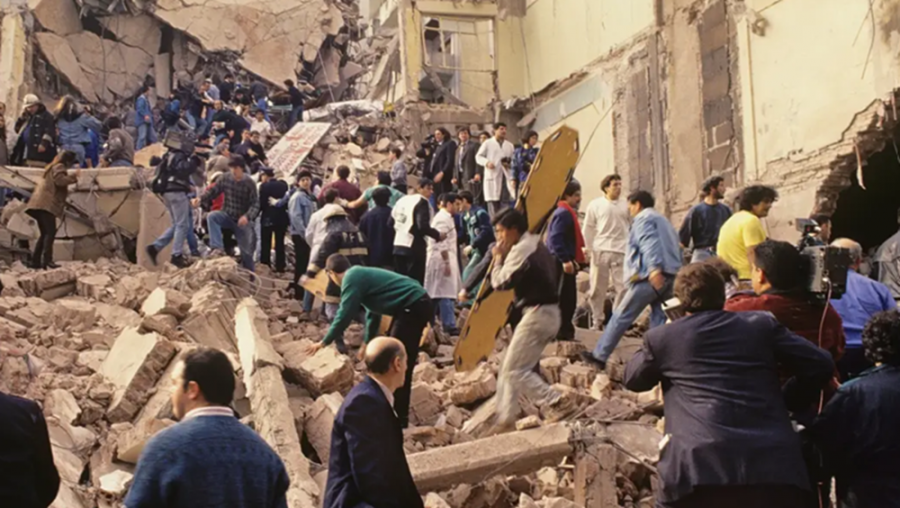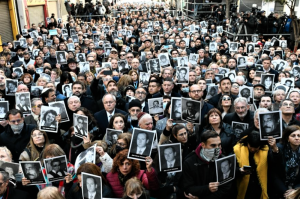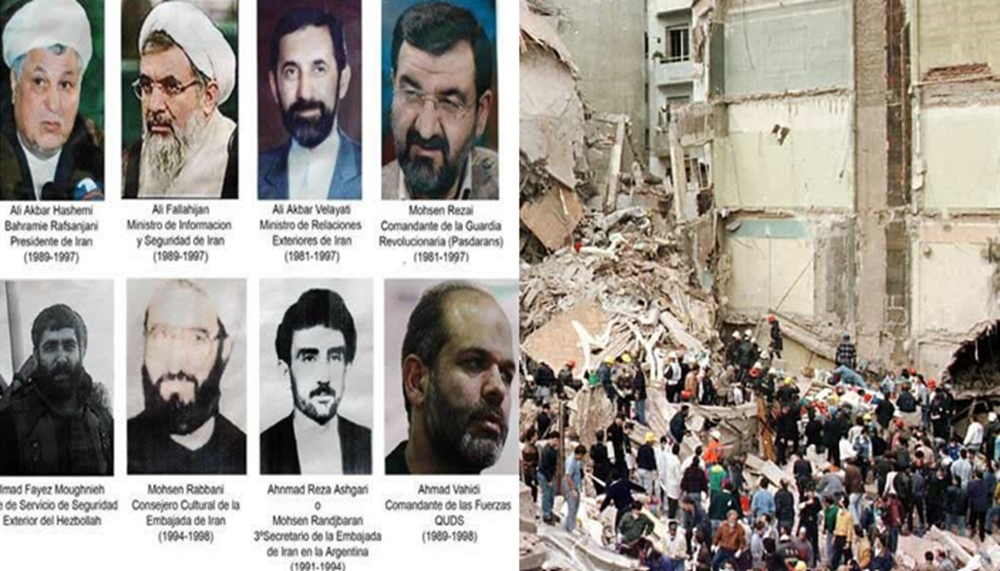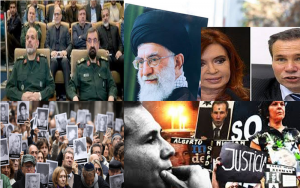
(Video) AMIA Bombing: Argentina Points Finger at Iran in Landmark Ruling
The Iranian regime’s support for militant groups exacerbates conflicts and undermines efforts to achieve lasting peace and stability in the Middle East.
PARIS, FRANCE, April 15, 2024 /EINPresswire.com/ -- The National Council of Resistance of Iran (NCRI) Foreign Affairs Committee in an article announced that Argentina’s highest criminal court recently issued a groundbreaking ruling, attributing responsibility to Iran for the devastating 1994 bombing of the AMIA Jewish community center in Buenos Aires.
This significant development in the longstanding investigation categorizes the attack as a “crime against humanity” and designates Iran as a “terrorist state.” The court’s declaration, revealed in documents released on Thursday, April 11, not only marks a crucial step forward in seeking justice for the 85 lives lost and nearly 300 individuals injured but also provides a legal pathway for victims to pursue accountability.
The attack, known as the AMIA bombing, occurred on July 18, 1994, targeting the Argentine-Israeli Mutual Association (AMIA) building in Buenos Aires. It was one of the deadliest terrorist incidents in Argentina’s history. Investigations quickly pointed to Iranian involvement, with Lebanese Hezbollah and its offshoot Ansar Allah attacking proxies of the Iranian regime.
Over the years, efforts to uncover the truth behind the bombing faced numerous challenges, including attempts by the Iranian regime to obstruct investigations and mislead authorities. High-ranking Iranian officials, including former Intelligence Minister Ali Fallahian and former commander of the Islamic Revolutionary Guard Corps (IRGC) Mohsen Rezae, were among those implicated in the attack.
The Interpol issued Red Notices for several Iranian officials suspected of involvement in the bombing, highlighting the international dimension of the investigation. However, the pursuit of justice faced setbacks, including the assassination of Argentine lead prosecutor Alberto Nisman in 2015, who was actively investigating the case. He was allegedly about to uncover evidence accusing the Argentinian’s former president of cover-up.
On Thursday, December 7, 2017, a federal judge in Argentina issued arrest warrants for the country’s former president, Cristina Fernandez de Kirchner, along with several of her associates, including her Minister of Foreign Affairs, Hector Timerman. They were charged with “treason” for allegedly concealing the involvement of Iranian regime officials in the AMIA bombing.
Despite these challenges, the determination to hold those responsible for the AMIA bombing to account persisted. Cardinal Jorge Mario Bergoglio, who later became Pope Francis, was one of the first public figures to advocate for justice in the case. His support and continued pressure from various quarters helped keep the spotlight on the investigation.
The Iranian Resistance played a crucial role in exposing the Iranian regime’s involvement in the bombing, providing critical intelligence, and pushing for international action. On August 10, 1994, The Washington Post published an article sourced from the National Council of Resistance of Iran (NCRI). The report implicated numerous high-ranking officials in Tehran, as disclosed by the Post.
The NCRI’s efforts underscored the need for accountability and justice not only for the victims of the AMIA bombing but also for the countless other victims of Iranian-sponsored terrorism worldwide.
The recent court ruling in Argentina represents a significant step forward in the pursuit of justice for the victims of the AMIA bombing. By holding the Iranian regime accountable and declaring it a “terrorist state,” the court sends a powerful message that terrorism and its sponsors will not escape justice.
However, challenges remain, and the international community must continue to support efforts to combat terrorism and hold its perpetrators accountable.
The AMIA bombing stands as a stark reminder of the global reach and destructive capabilities of state-sponsored terrorism. The Iranian regime’s involvement in orchestrating such a heinous act highlights the need for robust international cooperation to combat terrorism in all its forms.
The court’s ruling not only provides a measure of closure for the victims’ families but also serves as a beacon of hope for justice in the face of such senseless violence.
Neglecting the Iranian regime’s involvement in terrorism not only undermines efforts to achieve justice for past atrocities but also encourages it to perpetrate further acts of violence. The regime’s unchecked support for terrorist groups has far-reaching consequences, as seen in events such as the October 7th attack and the ongoing tragedy in Gaza.
By failing to hold the regime accountable for its actions, the international community inadvertently enables its continued aggression and destabilizing activities across the region.
The October 7th attack and the ongoing crisis in Gaza serve as poignant reminders of the human cost of terrorism and the urgent need for concerted action to address its root causes.
The Iranian regime’s support for militant groups exacerbates conflicts and undermines efforts to achieve lasting peace and stability in the Middle East.
Therefore, holding the regime accountable for its sponsorship of terrorism is not only a matter of justice but also a crucial step towards preventing further bloodshed and promoting peace in the region.
What the Iranian regime doing now in the region is exactly following the same thing as in 1994.
The United States Central Command (CENTCOM) announced that the U.S. government has transferred confiscated arms and ammunition from the Islamic Revolutionary Guard Corps (IRGC) to Ukraine to aid the country in defending itself against Russian aggression.
The IRGC had previously intended to supply these weapons and ammunition to Houthi rebels in Yemen, but the shipments were intercepted by U.S. military personnel stationed in the region.
According to CENTCOM’s statement on Tuesday, April 9, the transferred weapons included 5,000 Kalashnikov rifles, rifles for snipers, RPGs, and over 500,000 rounds of ammunition. These items were seized from four ships attempting to transport them to Yemen.
The confiscation and subsequent transfer occurred between May 22, 2021, and February 15, 2023.
The U.S. government, which had obtained ownership of these confiscated items against the IRGC through a decree from the Ministry of Justice on December 1, 2023, provided them to Ukraine on April 4 of this year.
In its statement, CENTCOM deemed the IRGC’s actions in smuggling weapons to Yemen as a violation of United Nations Security Council Resolution 2216, adopted in 2015, which prohibits destabilizing activities in Yemen, such as the transfer of weapons to the country.
Furthermore, CENTCOM stated that Washington is committed to countering Iran’s support for armed groups in the Middle East and will utilize all legal means, including U.S. and UN sanctions, to address Iran’s actions that pose a threat to regional and international security.
The U.S. has previously supported Ukraine by providing approximately 1.1 million rounds of ammunition seized from the IRGC by the U.S. Navy in Oct. last year.
Since the start of the Middle East conflict, Tehran-backed proxies have endangered maritime security in the region by attacking international ships in the Red Sea, the Bab-el-Mandeb Strait, and the Gulf of Aden.
CENTCOM also announced on April 8 that its forces successfully thwarted threats posed by Iranian-backed Houthi terrorists in Yemen. Engaging between approximately 12:15 p.m. and 2:40 p.m. (Sanaa time), USCENTCOM destroyed an air defense system, a ground control station, and an unmanned aerial system launched by Houthi insurgents over the Red Sea. No injuries or damage were reported by U.S., coalition, or commercial ships.
Additionally, on April 7 around 8:00 a.m. (Sanaa time), a Houthi-launched anti-ship ballistic missile targeted a coalition ship escorting M/V Hope Island, a cargo vessel flagged in the Marshall Islands, owned by the United Kingdom, and operated by Italy.
If you wish to receive the NCRI weekly Newsletter, please use the following link to subscribe: https://bit.ly/3SMgEla.
Shahin Gobadi
NCRI
+33 6 61 65 32 31
email us here
The IRGC had previously intended to supply weapons and ammunition to Houthi rebels in Yemen, but the shipments were intercepted by U.S. military in the region.
EIN Presswire does not exercise editorial control over third-party content provided, uploaded, published, or distributed by users of EIN Presswire. We are a distributor, not a publisher, of 3rd party content. Such content may contain the views, opinions, statements, offers, and other material of the respective users, suppliers, participants, or authors.






